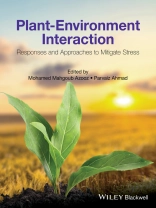The increase in global population, urbanization and industrialization is resulting in the conversion of cultivated land into wasteland. Providing food from these limited resources to an ever-increasing population is one of the biggest challenges that present agriculturalists and plant scientists are facing. Environmental stresses make this situation even graver. Plants on which mankind is directly or indirectly dependent exhibit various mechanisms for their survival. Adaptability of the plants to changing environment is a matter of concern for plant biologists trying to reach the goal of food security. Despite the induction of several tolerance mechanisms, sensitive plants often fail to withstand these environmental extremes. Using new technological approaches has become essential and imperative.
Plant-Environment Interaction: Responses and Approaches to Mitigate Stress throws light on the changing environment and the sustainability of plants under these conditions. It contains the most up-to-date research and comprehensive detailed discussions in plant physiology, climate change, agronomy and forestry, sometimes from a molecular point of view, to convey in-depth understanding of the effects of environmental stress in plants, their responses to the environment, how to mitigate the negative effects and improve yield under stress.
This edited volume is written by expert plant biologists from around the world, providing invaluable knowledge to graduate and undergraduate students in plant biochemistry, food chemistry, plant physiology, molecular biology, plant biotechnology, and environmental sciences. This book updates scientists and researchers with the very latest information and sustainable methods used for stress tolerance, which will also be of considerable interest to plant based companies and institutions concerned with the campaign of food security.
Tabella dei contenuti
List of contributors, vii
Preface, x
About the editors, xii
1 Biotechnological applications to improve salinity stress in wheat, 1
Sami ullah Jan, Ghulam Kubra, Mehreen Naz, Ifrah Shafqat, Muhammad Asif Shahzad, Fakiha Afzal and
Alvina Gul Kazi
2 Soybean under abiotic stress: Proteomic approach, 28
Arafat Abdel Hamed Abdel Latef, Sumaira Jan, Elsayed Fathi Abd?-Allah, Bushra Rashid, Riffat John and Parvaiz Ahmad
3 Proteomic analysis of food crops under abiotic stresses in the context of climate change, 43
P. S. Sha Valli Khan, P. Osman Basha, G. Vijaya Lakshmi, M. Muniraja, K. Sergeant and J. F. Hausman
4 Transcriptome modulation in rice under abiotic stress, 70
Smita Kumar and Prabodh Kumar Trivedi
5 Sulphur: Role in alleviation of environmental stress in crop plants, 84
Dagmar Prochazkova, Daniela Pavlikova and Milan Pavlik
6 Proline and glycine betaine modulate cadmium?]induced oxidative stress tolerance in plants: Possible biochemical and molecular mechanisms, 97
Mohammad Anwar Hossain, David J. Burritt and Masayuki Fujita
7 Enhancement of vegetables and fruits growth and yield by application of brassinosteroids under abiotic
stresses: A review, 124
Bojjam Vidya Vardhini
8 Physiological mechanisms of salt stress tolerance in plants: An overview, 141
Hadi Pirasteh?-Anosheh, Gholamhassan Ranjbar, Hassan Pakniyat and Yahya Emam
9 Heat stress in wheat and interdisciplinary approaches for yield maximization, 161
Sajjad Hussain, Muhammad Jamil, Abdul Aziz Napar, Rida Rahman, Asghari Bano, Fakiha Afzal, Alvina Gul
Kazi and Abdul Mujeeb?-Kazi
10 Effect of elevated CO2 and temperature stress on cereal crops, 184
Ashutosh Tripathi, Devendra Kumar Chauhan, Gopal S. Singh and Niraj Kumar
11 Lipid metabolism and oxidation in plants subjected to abiotic stresses, 205
Adriano Sofo, Antonio Scopa, Abeer Hashem and Elsayed Fathi Abd?-Allah
12 Physiological response of mycorrhizal symbiosis to soil pollutants, 214
Mercedes Garcia?-Sanchez, I. Garcia?-Romera, J. A. Ocampo and E. Aranda
13 Microbially derived phytohormones in plant adaptation against abiotic stress, 234
Dilfuza Egamberdieva
14 Synergistic interactions among root?]associated bacteria, rhizobia and chickpea under stress
conditions, 250
Dilfuza Egamberdieva, Anvar Abdiev and Botir Khaitov
15 Plant secondary metabolites: From molecular biology to health products, 263
L. F. De Filippis
16 Medicinal plants under abiotic stress: An overview, 300
Sameen Ruqia Imadi, Alvina Gul Kazi, Abeer Hashem, Elsayed Fathi Abd?]Allah, A. A. Alqarawi and Parvaiz Ahmad
17 Signalling roles of methylglyoxal and the involvement of the glyoxalase system in plant abiotic stress responses and tolerance, 311
Tahsina Sharmin Hoque, Mohammad Anwar Hossain, Mohammad Golam Mostofa, David J. Burritt and
Masayuki Fujita
18 Role of sedges (Cyperaceae) in wetlands, environmental cleaning and as food material: Possibilities and future perspectives, 327
Sanjay Mishra, Ashutosh Tripathi, Durgesh Kumar Tripathi and Devendra Kumar Chauhan
Index, 339
Circa l’autore
Professor Mohamed Mahgoub Azooz, Department of Botany, Faculty of Science, South Valley University, Quena, Egypt
Dr Parvaiz Ahmad. Department of Botany, S.P. College, Jammu and Kashmir, India












